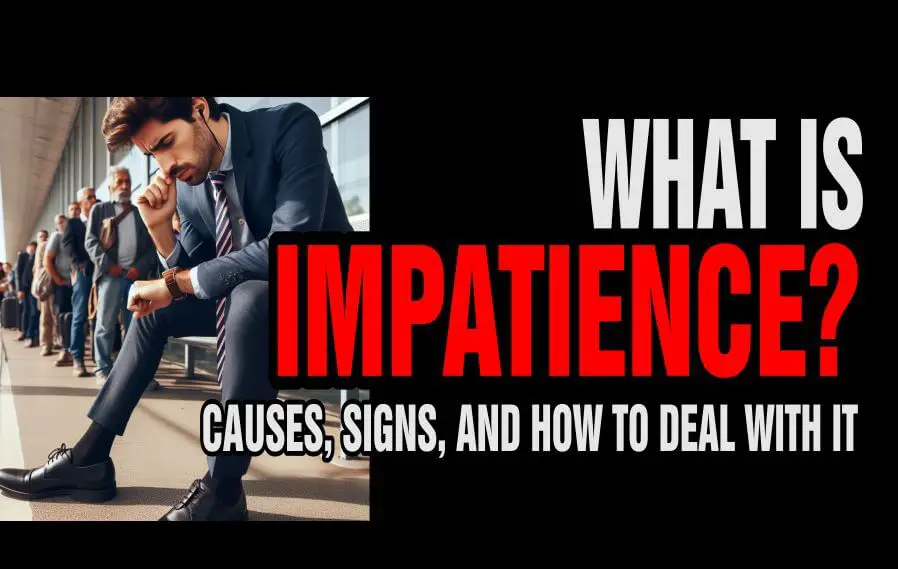What is impatience? Discover how to recognize impatience, a common pseudo-emotion with various causes and signs, and effective strategies for dealing with it.
Impatience is a feeling we have all experienced at some point. It emerges when we struggle to tolerate delays, obstacles, or inconveniences.
We experience it mostly unconsciously when we react to it impulsively according to the urgency we want to achieve.
While throwing tantrums or worrying, which are signs of impatience, might yield instant results sometimes, it’s mostly not a healthy feeling.
This article aims to shine a bright light on the concept of impatience, its causes, signs, and examples, and how you can successfully manage these challenging effects.
Recommended: Introduction To Emotional Intelligence
What is Impatience?
Impatience can be defined as a state of restlessness, irritability, or frustration that arises when you encounter obstacles, delays, or circumstances that hinder your immediate desires.
Impatience is an emotional state characterized by a strong desire for immediate results and an intolerance for delay or obstacles.
It often stems from a combination of psychological, emotional and environmental factors such as high expectations, time pressure, and a lack of control over a situation.
This feeling can manifest as irritability, restlessness, or difficulty concentrating.
It can lead to impulsive decision-making and heightened stress levels.
Related: 10 Powerful Emotions Used in Persuasion
Is Impatience an Emotion?
Impatience is not considered an emotion in the traditional sense. It is more accurately described as a state of mind or a disposition towards becoming frustrated or irritated due to delays or obstacles.
Emotions typically refer to intense feelings that arise in response to specific stimuli, such as happiness, sadness, anger, fear, etc.
While impatience can lead to the experience of various emotions, it is not an emotion in and of itself.
Recommended: Lessons Only Life Can Teach
Impatience and Anger
While impatience is a feeling of restlessness or frustration due to a delay or the inability to achieve immediate results, anger is an intense emotional response usually triggered by a perceived injustice, insult, or frustration.
Anger involves a stronger and more explosive reaction than impatience and often includes feelings of resentment, hostility, and the desire to retaliate.
While both impatience and anger involve negative emotions, impatience is more focused on the immediate outcome, while anger is a deeper emotional response to a specific event or situation.
Related: How To Influence With Emotions
Impatience as a Weakness
Impatience can be considered a weakness as it hinders the ability to wait or tolerate delays without feeling frustrated or restless.
If you are impatient often, you struggle with rushing into decisions or actions without thoroughly evaluating the situation, leading to potential mistakes or poor outcomes.
Your impulsive nature may also hinder effective communication, as you may interrupt others or fail to listen attentively.
Also, impatience can create unnecessary stress and tension, both personally and in relationships or professional settings.
Developing patience allows for better decision-making, understanding, and overall growth, enabling you to navigate challenges with a calmer and more composed demeanour.
Related: How Emotions Shape Thoughts and Behaviours
Anxiety and Impatience
Anxiety and impatience are two distinct emotional states, although they may appear to share some similarities.
Anxiety is characterized by a feeling of unease, worry, or fear often due to an impending or uncertain outcome.
It is typically accompanied by physical symptoms such as restlessness, increased heart rate, and difficulty concentrating.
On the other hand, impatience as we have seen in this article is a state of annoyance or frustration when waiting for something or someone, often resulting from a desire for immediate results or resolution.
It is usually not accompanied by the same physical symptoms as anxiety.
While both can be unpleasant, anxiety generally arises from a deeper level of concern, while impatience stems from a desire for quick outcomes.
Related: 15 Phrases That Make You Emotionally Intelligent
Psychology Behind Impatience
Impatience can be explained by several psychological factors. One such factor is impulsivity, which refers to the tendency to act immediately without considering the consequences.
This impulsive behaviour often leads to impatience as individuals struggle to delay gratification.
Additionally, cognitive biases such as the focusing illusion can contribute to impatience, as people tend to overemphasize the importance of their immediate desires over long-term goals.
Furthermore, the fear of missing out (FOMO) can fuel impatience, as individuals feel pressured to act quickly to secure desired outcomes.
Finally, high levels of stress and anxiety can also contribute to impatience, as individuals seek relief and resolution in immediate responses.
Related: Emotional Awareness: The Proactive Way To Regulate Your Emotions
What Causes Impatience?

Impatience can be as a result of many factors, including the following:
Society’s Need for Instant Gratification: Impatience can arise from societal norms that prioritize immediate rewards, leading individuals to expect quick outcomes and become frustrated when they are delayed.
Stressful and Fast-paced Lifestyles: The demands of modern life can create a sense of urgency, making it challenging to tolerate delays or setbacks, contributing to impatience.
Unrealistic Expectations: Setting overly ambitious or rigid goals can fuel impatience when progress falls short of these high standards.
Overloaded Schedules: Having too many commitments and responsibilities can create a constant sense of urgency, making it difficult to be patient with the pace of events.
Lack of Control Over External Factors: When individuals feel powerless to influence external circumstances, they may become impatient due to their inability to expedite desired outcomes.
Suggested: Tips on Developing Emotional Intelligence?
Signs of Impatience
Impatience can manifest in many different ways including the following:
Tapping Fingers, Fidgeting, or Restlessness: Physical manifestations of impatience, such as repetitive movements or an inability to keep still, can indicate inner agitation and a desire for immediate action.
Restlessness and Irritability: Feeling constantly on edge or easily agitated by minor delays or inconveniences can signal impatience.
Difficulty Focusing or Paying Attention: Impatience can lead to a lack of concentration and an inability to stay present, as the mind is preoccupied with anticipated outcomes.
Impulsive Behaviour or Making Rushed Decisions: Acting hastily without considering all options or consequences may be a sign of impatience influencing decision-making.
Increased Heart Rate or Physical Tension: Physiological responses like a racing heart or muscle tension can accompany impatience, reflecting the body’s heightened state of arousal.
Related: When Your Instintual Brain Takes Control
Examples of Impatience
Here are some examples of impatience that is observable in people every other day:
- Impatience in relationships: Losing patience due to communication barriers or unmet expectations.
- Impatience at work: Becoming frustrated when colleagues or clients fail to meet deadlines or deliver results promptly.
- Impatience in traffic: Reacting negatively to delays or slow drivers on the road.
How to Deal with Impatience
How to overcome impatience requires proactive effort. Here are some practical strategies that can help individuals deal with impatience effectively:
1. Cultivate Self-awareness
Developing self-awareness regarding your impatience triggers and recognizing the physical and emotional signs can be a powerful first step in managing impatience.
By acknowledging the circumstances and the effects impatience has on your well-being, you can begin to understand the root causes.
2. Set Realistic Expectations
Impatience often arises when our expectations do not align with reality.
Setting realistic expectations allows us to navigate situations with greater ease, avoiding unnecessary frustration.
By establishing achievable goals and being aware of potential obstacles, we can better manage our impatience when things do not go according to plan.
3. Practice Patience-building Exercises
Engaging in activities that deliberately challenge our patience can help build resilience.
This may include meditation, deep breathing exercises, or mindfulness practices.
Such exercises encourage a calmer mindset, helping us better manage impatience during challenging situations.
4. Time Management and Organization
Improving time management skills and organization can significantly reduce impatience.
By prioritizing tasks, creating schedules, and setting deadlines, we gain better control over our lives and minimize stress.
This, in turn, can help us withstand delays and inconveniences without becoming overwhelmed or impatient.
5. Develop Effective Coping Mechanisms
Discovering healthy coping mechanisms is vital as impatience often arises from feeling overwhelmed or unable to control the situation.
Techniques such as reframing thoughts, focusing on gratitude, or finding alternative activities to distract the mind can help redirect our energy and reduce impatience’s negative impact.
6. Seek Support from Others
Social networks can provide valuable support when dealing with impatience.
Sharing experiences, concerns, and frustrations with trusted individuals can help put things into perspective.
Additionally, seeking advice and learning from others who have successfully overcome impatience can be invaluable.
Practice Empathy and Understanding
By developing empathy towards others, we can better understand their circumstances and motivations.
This reduces the likelihood of projecting our own impatience onto them.
Adopting a compassionate mindset allows us to navigate relationships and situations with more patience and understanding.
Frequently Asked Questions
What is the full meaning of impatience?
The full meaning of impatience is the inability to tolerate delay or frustration, often leading to restlessness or irritability in response to unmet desires or expectations.
How do you describe impatience?
Impatience is best described as a state of agitation or frustration resulting from a desire for immediate results and an intolerance for delay or obstacles.
What is mean by impatient?
Being impatient means feeling restless or agitated due to a strong desire for immediate results and an inability to tolerate delays or setbacks.
What is patience and impatience?
Patience is the ability to remain calm and tolerant in the face of delay or adversity, while impatience is the inability to tolerate such delays.
How do you overcome being impatient?
Overcoming impatience involves developing self-awareness, practicing mindfulness, setting realistic expectations, and employing strategies such as deep breathing and time management techniques.
What is the root cause of impatience?
The root cause of impatience can vary, but it often stems from factors such as societal pressure for instant gratification, stressful lifestyles, unrealistic expectations, and a lack of control over external factors.
Is there a cure for impatience?
While impatience may not have a specific “cure,” individuals can learn to manage and reduce it through self-awareness, mindfulness, and the development of patience-building strategies.
How do you overcome impatience in the workplace?
To overcome impatience in the workplace, individuals can practice time management, set realistic goals, communicate effectively, and cultivate a supportive and understanding work environment.
Conclusion
Impatience is a prevalent emotion that can impact our mental well-being and relationships if left unchecked.
This article has explored impatience by addressing its causes, and signs, and providing relevant examples.
Furthermore, practical strategies have been outlined to help you effectively cope with and overcome impatience.
By cultivating self-awareness, embracing empathy, setting realistic expectations, and practicing patience-building exercises, you can enhance your ability to manage impatience constructively.
References:
2. https://www.minimalismmadesimple.com/home/being-impatient/
https://www.mindtools.com/a4xvpkl/patience
3. https://www.wisebread.com/10-ways-to-stop-being-impatient-and-live-a-more-satisfied-life
4. https://chenaltherapy.com/how-to-keep-calm-in-times-of-impatience-and-why-its-important-to-do-so/
5. https://mantracare.org/therapy/what-is/impatience-laws/
Pyo Merez (PsyD) is a distinguished adolescent and adult psychologist at the forefront of mental health advocacy.
With expertise in cognitive and developmental psychology, focusing on social relationships, cultural contexts, and individual differences, Pyo has dedicated his career to empowering adolescents and adults.
As a sought-after speaker and panelist, Pyo shares invaluable insights on issues affecting young people, contributing to a deeper understanding of mental health and well-being in today's society.

